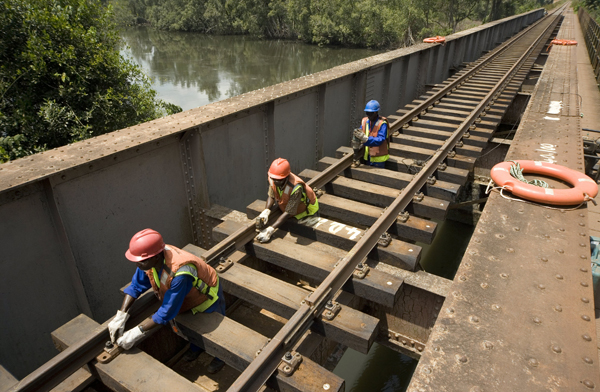Sierra Leone woos miners to clean energy with $11 billion plan

Sierra Leone wants mining companies to connect to the grid and help reassure renewable-energy investors there’s enough demand in the West African nation to justify an ambitious $10.9 billion power plan.
Most mining firms rely on their own diesel supplies to extract iron ore, diamonds, rutile and bauxite in the resource-rich country. Sierra Leone would require them to switch over to the grid by 2040, according to an energy-transition roadmap launched earlier this month.
The plan seeks to increase capacity 15-fold to 4,500 megawatts by 2050 — 90% of it fueled by renewable energy — in an expansion that would cost an estimated $10.9 billion. That would be a huge jump for a country with existing installed capacity of just 300 megawatts.
The power that Sierra Leone currently produces is inadequate even for the few households and businesses already connected to the grid, spurring a heavy reliance on private fossil-fuel generators. The mining industry, which accounts for 70% of the country’s export earnings, self-generates more than 500 megawatts of electricity. Local units of the Gerald Group, based in the UK, and China Kingho Energy Group run some of the biggest operations.
Smaller economies like Sierra Leone can’t afford to pay for their own transition to cleaner energy and the high cost of capital makes borrowing too expensive, leaving them reliant on development finance and foreign investors.
The prospect of connecting mining companies would help attract private funding for the plan, Kandeh Yumkella, the chairman of a presidential initiative on climate change and renewable energy, said in an interview.
“If we do that, our utility becomes profitable immediately,” he said. It would also help miners “green” their operations.
“Anchor demand” from these firms would help expand electricity access to households in one of the least electrified countries in the world, Yumkella said. Less than a third of the 8.5 million population of Sierra Leone has access to electricity, according to the World Bank.
“It is an idea that most companies are gravitating toward,” said Ibrahim Sorie Kamara, secretary of the Sierra Leone Chamber of Mines. “Producing your own electricity is expensive and logistically challenging,” he said. “If this power can be sustainable and reliable, it will make economic sense.”
Sierra Leone plans to import energy from the West African Power Pool — a regional electricity market — to feed its grid until it ramps up its domestic production, with an initial focus on hydro and solar power, Deputy Energy Minister Edmond Nonie said in an interview.
The government is also working to resolve issues with some of its existing partners while courting new ones.
Turkish operator Karpowership last year temporarily stopped supplies to the country over debt that Sierra Leone has started paying down. President Julius Maada Bio took control of the energy ministry in April after Kanja Sesay’s resignation as minister over the power crisis.
If the country doesn’t move toward cleaner generation, “its mining industry will face the carbon challenge, whether it’s a carbon tax or a preference from customers for cleaner products,” said Joseph Nganga, vice president for Africa at the Global Energy Alliance for People and Planet, which is advising the government. “It’s also important for the climate.”
(By Yinka Ibukun)
{{ commodity.name }}
{{ post.title }}
{{ post.date }}




Comments